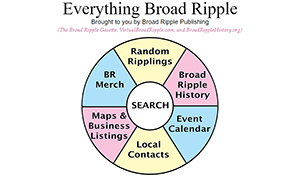
|
Broad Ripple Random Ripplings

The news from Broad Ripple
Brought to you by The Broad Ripple Gazette
(Delivering the news since 2004, every two weeks)

|
| Brought to you by: |

|

|

|

|

|

|
Converted from paper version of the Broad Ripple Gazette (v04n10)
The Word on Real Estate - Advice from a Pro: By Clark Giles
posted: May 18, 2007
Score High and Keep Interest Low
Credit scoring is a system that helps you to get a lower loan interest rate, a higher loan amount, and a better insurance rate. Your score is calculated from a point system by companies known as credit bureaus in order to establish your credit standing. A credit scores are determined by several factors. These includes the history of your credit, your accounts, debt history, etc. Each of these factors raises or lowers your credit score. There are several ways to keep a good credit score and benefit from it. The first is to make sure that your payments are always on time. Every thirtieth, sixtieth and ninetieth late payment affects your credit score in an increasingly negative fashion. The more you use your credit and pay it off, the higher the score you receive. Though I personally have some issues with a system that rewards people going into debt with a higher credit limit, and would counsel against taking on debt simply to raise your score (since the overwhelming majority of well-intentioned individuals never pay off their card), this is the way the system operates. Your credit history (and the types of credit that you have) will determine the score assigned.
There are several ways to improve a poor credit score. First, determine what your credit score is. The three major credit bureaus; Equifax, Experian and Trans-Union; offer free reports once a year at a co-sponsored website (www.annualcreditreport.com). Your report is broken down into the following categories: payment history, outstanding debt, length of credit history, inquiries on your credit score and the types of credit in use. No points will be deducted for occasionally checking the status of your credit report, but frequent or repeated inquiries can lower your score.
The next step is to make sure that all of the information in the report is accurate. This should happen no later than thirty days after you receive the report. The dispute will then be investigated and proven acceptable or not. Preventing inaccurate credit reporting and identity theft will automatically improve your credit score. You have the right to remove any negative comments from your credit report, as well. Following an information dispute, if the entry is found to be valid, you should check on the status of the report one or two years later to make sure that it is not on your record.
The next things to check in your credit report are the accounts or collections that are past due. By paying off outstanding payments, your credit score will improve dramatically. Another part of paying off debt is eliminating credit cards if you have too many. It is also important not to cancel cards unless you have a one-year history with them, as this would affect your score (if need be, cut the card up so you can't use it and then cancel the account after a year). If you have several different credit cards, don't switch them around in order to change the rate for payments. This will show up in your credit history and will lower your score.
The easiest way to establish good credit is to pay bills on time. This is the factor that most affects credit scoring. Even if you are not able to pay off the entire balance, making some sort of payment before bills are due will help mitigate point deductions. If you don't have any credit history, start now. Establishing credit history will help you later on if and when you need a home loan. By establishing a credit history now, you are showing that you can be responsible with debt in the future.

|

|

|
| Brought to you by: |

|

|

|
| Brought to you by: |

|

|

|


